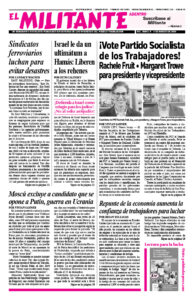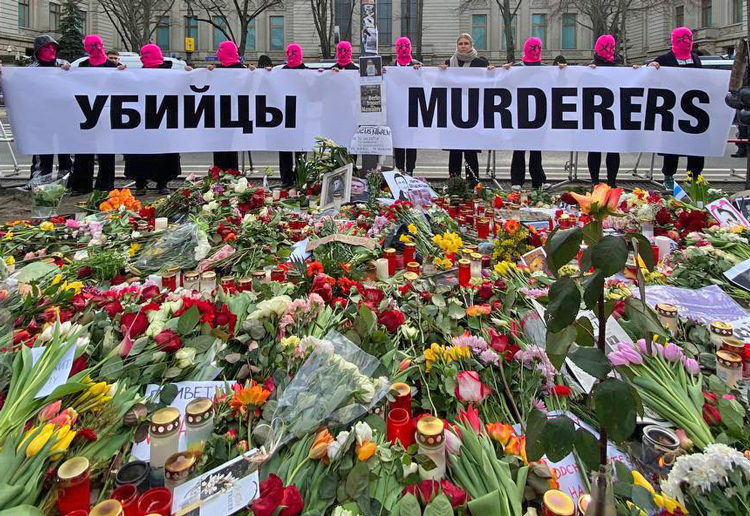The Russian government informed Alexei Navalny’s family Feb. 16 that he had died in prison. Navalny, a well-known critic of the government in Moscow, had been incarcerated in one of Russia’s harsh prison colonies in the Arctic Circle.
The announcement led to protests in over 200 cities and towns across the country and other protests around the world, blaming Russian President Vladimir Putin’s regime for his death and demanding to know the circumstances involved. These actions, despite a crackdown by Russian authorities, are an important sign of growing opposition to the Putin regime as it enters its third year of war against the Ukrainian people.
In Moscow and St. Petersburg hundreds of people gathered at monuments dedicated to victims of Joseph Stalin’s political repression. From western Russia to Siberia, people laid flowers and photos of Navalny in cities like Nizhny Novgorod, Novosibirsk, Kazan, Kaluga and Tula.
Police cracked down on the protests. In the first two days after the announcement of Navalny’s death, over 400 people were detained, the human rights OVD-Info source reported. This included 200 in St. Petersburg alone and arrests in 31 other cities.
In Berlin, a memorial protest for Navalny at the Russian Embassy included the performance art collective Pussy Riot and former Russian state TV employee Marina Ovsyannikova, who was fired for opposing Moscow’s invasion of Ukraine on a live broadcast in March 2022. Her sign at the Berlin gathering quoted Navalny, “Don’t give up!”
Navalny, who was the main bourgeois political opponent of Putin, ran for president in 2018 but was barred from the ballot. After spending time in Germany recovering from being poisoned in Russia by a military-grade nerve toxin that Navalny said was ordered by Putin, he returned to Russia in 2021. He was arrested right away and stood trial on frame-up charges of “embezzlement.” Navalny was ultimately sentenced to more than 20 years in prison, including for “extremism.” He was kept at three of Russia’s most notorious prisons.
On Feb. 17 Navalny’s mother and his lawyer visited the prison where Alexei Navalny died. They were told his body had been sent to a morgue in nearby Salekhard. Reaching there, they were told the body wasn’t there. All this to cover up the facts of what led to his death.
Navalny’s supporters have collected nearly 55,000 signatures on an online petition demanding his body be turned over to relatives. Officials now say this won’t be done for at least two more weeks of “chemical investigation.”
Opposition to Putin’s Ukraine war
A few days earlier, Vladimir Kara-Murza, held in a Siberian gulag-like penal colony in Omsk, spoke out, highlighting what was by far the largest mobilization opposing Moscow’s war against the people of Ukraine. He was talking about the 200,000-plus Russians who had turned out to stand in lines and sign petitions to put Boris Nadezhdin — running to oppose that war — on the ballot for president.
Kara-Murza began serving a 25-year prison term in April 2022 for speaking out against Putin’s war. He was convicted of treason and other charges. He had been a candidate for parliament and served as deputy leader of the People’s Freedom Party.
“If you listen to Vladimir Putin’s propaganda, things couldn’t be going better for him,” Kara-Murza wrote in an article run in the Feb. 14 Washington Post. “But actions speak louder than words. The Kremlin’s propaganda narrative was shown up last week when the Central Election Commission barred Boris Nadezhdin, the sole antiwar candidate running in Russia’s presidential election, from the March ballot.”
Russian authorities cited “technical irregularities” in a small percentage of the over 100,000 signatures — as well as home addresses and passport data — submitted on his nominating petitions. But the “real reason,” Kara-Murza said, was that “the Putin administration had underestimated how many Russians are actually opposed to the war in Ukraine — and that Nadezhdin was polling in the double digits.
“People formed long lines at Nadezhdin’s campaign offices to sign the petitions,” he wrote. “The wait was often several hours; the majority of those who came were young people. It was about these lines — the largest antiwar demonstration in Russia since Putin’s attack on Ukraine — that most people wrote to me through the prison mail in January.”
Many people had become demoralized, believing they were alone in their opposition to the war. The long and public lines changed everything. “For many Russians,” Kara-Murza wrote, “the sudden takeoff of Nadezhdin’s campaign was not just a pleasant surprise, it was a much-needed morale boost.”
The turnout, he said, wasn’t just in the big cities. In faraway places like Novorossiysk and Gorno-Altaysk there were long lines of people waiting to sign.
“The mood change was as marked as it was sudden. ‘It was unbelievable to see that there are so many of us,’ one young woman, a single mother, wrote me from Eastern Siberia. ‘For the first time in two years I felt at home in my own country.’
“Putin’s official vote tally on March 17 will likely be the highest in all his 24 years in power,” Kara-Murza noted. “But it will also be the furthest removed from reality. A small upstart campaign by a cautious critic has exposed the lie behind the Kremlin claims of solid public support for Putin and for his war.”
And all of this happened, he said, “despite a total blackout of his campaign.”
“This doesn’t mean that change will happen tomorrow or next month,” Kara-Murza concluded. “But a society that feels more empowered and more confident about itself is suddenly a force to be reckoned with. And that is bad news for any dictator.”



